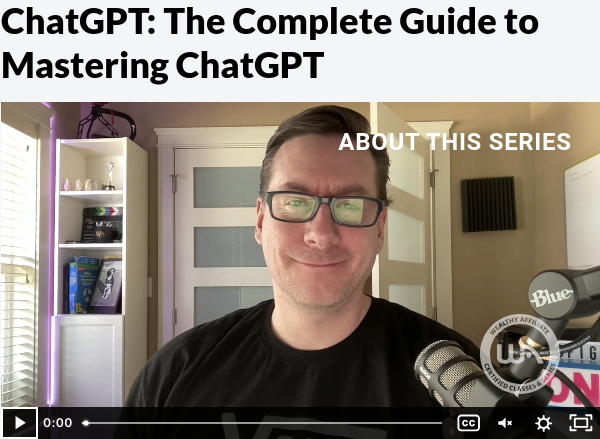Introduction to SEO to a Beginner
Focusing on SEO to drive traffic to a blog is crucial for affiliate marketers because it offers a cost-effective, sustainable, and targeted approach to attracting relevant visitors who are more likely to convert into affiliate sales, ultimately contributing to the blog’s monetization efforts.
Focusing on SEO (Search Engine Optimization) to drive traffic to a blog for a blogger like myself, who relies on affiliate marketing for monetization, offers a few no-brainer compelling reasons…
We’re diving deep into the world of SEO, and let me tell you, if you’re not optimizing your blog for search engines, you’re leaving money on the table, my friends.
Now, picture this: You’re grinding hard on your blog, pumping out killer content left and right, but you’re not seeing the traffic you deserve. What gives? That’s where SEO comes into play, my fellow hustlers. It’s like the secret sauce that takes your blog from “meh” to “heck yeah!”
Let’s break it down. First up, we’ve got Organic Traffic. This is the bread and butter of SEO, folks. We’re talking about those sweet, sweet visitors who find your blog through search engines like Google, Bing, and Yahoo. And the best part? Unlike shelling out big bucks for paid ads, organic traffic is free real estate, baby! That means more moolah in your pocket and higher profit margins for your hustle.
Organic Traffic: SEO is a powerful strategy for driving organic traffic to your blog from search engines. Unlike paid advertising, which requires continuous spending to maintain visibility, organic traffic acquired through SEO efforts is free and sustainable. While SEO offers the potential for higher profit margins by eliminating the need for ongoing advertising expenses, it’s essential to recognize that SEO is a long-term investment. As a beginner to SEO, it’s crucial to focus on creating high-quality, optimized content, understanding keyword research, and implementing on-page and off-page optimization techniques. While the results may not be immediate, the organic traffic generated through SEO can lead to consistent and valuable traffic over time, ultimately contributing to the success of your affiliate marketing efforts.
But wait, there’s more! SEO isn’t just a one-hit wonder; it’s a long-term game changer. We’re talking about building a sustainable empire here, folks. By crafting killer content that’s optimized for search engines, you’re not just attracting visitors – you’re building a loyal tribe of raving fans who keep coming back for more. That’s what I call Long-term Sustainability, baby!
Long-term Sustainability: Effective SEO strategies can lead to long-term and sustainable traffic growth. By creating high-quality, SEO-optimized content, bloggers can attract visitors who are genuinely interested in the topics they cover. Over time, this can lead to a loyal readership base that consistently engages with the content and converts into affiliate sales. However, beginners to SEO should also keep in mind that long-term sustainability relies on more than just keyword optimization. While creating high-quality, SEO-optimized content is essential, it’s equally important to focus on user experience, website performance, and building a strong online presence. This includes factors such as website speed, mobile-friendliness, intuitive navigation, and engaging multimedia elements. Additionally, actively promoting content through social media, email marketing, and other channels can help attract a wider audience and drive traffic to the blog. By adopting a holistic approach to SEO that considers both search engine algorithms and user preferences, bloggers can foster long-term relationships with their audience and establish a sustainable platform for affiliate marketing success.
Now, let’s talk about Targeted Traffic. With SEO, you’re not just throwing spaghetti at the wall and hoping it sticks. Oh no, my friends. SEO allows you to laser-target specific keywords and phrases that are tailor-made for your niche. That means the traffic you attract is not just any old tire-kicker – they’re hot leads who are hungry for what you’re offering. And you know what that means? Higher conversion rates, more affiliate sales, and cha-ching, cha-ching, cha-ching!
Targeted Traffic: SEO allows bloggers to target specific keywords and phrases related to their niche and the products they promote through affiliate marketing. This means that the traffic they attract through SEO is more likely to be relevant and interested in the affiliate products or services being promoted, increasing the likelihood of conversions and affiliate commissions. While targeting specific keywords is a fundamental aspect of SEO, beginners should also focus on understanding user intent and providing valuable, informative content that meets the needs of their target audience. This means going beyond keyword optimization and creating content that addresses common questions, solves problems, and offers unique insights within their niche. By aligning content with the interests and preferences of their target audience, bloggers can attract highly targeted traffic that is more likely to engage with their content and convert into affiliate sales. Additionally, regularly monitoring and analyzing website analytics can provide valuable insights into user behavior and preferences, allowing bloggers to refine their SEO strategies and better cater to their audience’s needs over time.
And here’s the kicker: SEO is one heck of a Cost-Effective strategy. Sure, it takes a bit of time and elbow grease to get things rolling, but once you’re in the SEO groove, it’s like having a money-making machine that runs on autopilot. Say goodbye to expensive ad spend and hello to higher ROI, my friends.
Cost-Effectiveness: While SEO requires an investment of time and effort, the long-term benefits often outweigh the initial costs. Compared to paid advertising, where costs can quickly add up, SEO offers a cost-effective way to attract targeted traffic to a blog over time, ultimately leading to higher ROI for the blogger. While SEO presents a cost-effective strategy for driving traffic to a blog over time, beginners should understand that it’s not a one-time investment but rather an ongoing process that requires continuous learning and adaptation. Search engine algorithms are constantly evolving, which means that SEO strategies must also evolve to remain effective. This may involve staying updated on industry trends, experimenting with new techniques, and regularly optimizing content and website elements for better performance. Additionally, building a strong backlink profile, fostering relationships with other websites, and actively engaging with the online community can further enhance the effectiveness of SEO efforts. By committing to consistent improvement and staying informed about the latest SEO best practices, beginners can maximize the long-term benefits of SEO and achieve higher ROI for their blogging endeavors.
Last but not least, we’ve got ‘Authority’. When your blog consistently ranks high in search engine results, you’re not just another face in the crowd – you’re a bona fide authority in your niche. People trust you, they respect you, and they’re more than happy to whip out their credit cards and buy whatever you’re selling. That’s the power of SEO, baby!
Builds Authority: Creating SEO-optimized content can help establish the blogger as an authority in their niche. When their blog consistently ranks well in search engine results pages (SERPs) for relevant keywords, it enhances their credibility and trustworthiness in the eyes of both readers and search engines. This, in turn, can lead to increased visibility, more backlinks from other websites, and higher rankings, further amplifying the blog’s reach and potential for affiliate sales. While SEO-optimized content is essential for improving search engine rankings and building authority, beginners should also focus on creating valuable, informative content that resonates with their target audience. By providing unique insights, solving common problems, and offering actionable advice within their niche, bloggers can establish themselves as trusted authorities in their field. Additionally, actively engaging with the online community, participating in industry forums and discussions, and collaborating with other experts can further enhance the blogger’s credibility and reputation. Building strong relationships with other websites and influencers can also lead to valuable backlinks and increased visibility, ultimately amplifying the blog’s reach and potential for affiliate sales. By prioritizing the creation of high-quality, authoritative content and actively participating in their niche community, beginners can lay a solid foundation for long-term success in SEO and affiliate marketing.
Unlock SEO success with Jaaxy – the unrivaled solution for maximizing Organic Traffic, ensuring Long-term Sustainability, attracting Targeted Traffic, optimizing Cost-Effectiveness, and establishing Authority in your niche. With Jaaxy, there’s simply no better tool to propel your website to the top of search engine rankings and dominate the digital landscape.
In conclusion, diving into the world of SEO is not just a choice but a necessity for any blogger, especially those in the realm of affiliate marketing. As we’ve explored, SEO offers a multitude of benefits that are essential for driving sustainable growth and success in today’s digital landscape.
From the invaluable resource of organic traffic to the long-term sustainability it provides, SEO lays the groundwork for building a thriving online presence. With the power to attract targeted traffic, maximize cost-effectiveness, and establish authority within your niche, SEO is the key to unlocking your blog’s full potential.
But remember, success in SEO doesn’t happen overnight. It requires dedication, patience, and the right tools to navigate the ever-evolving landscape of search engine algorithms. That’s where Jaaxy comes in – your trusted ally in the journey towards SEO mastery.
With Jaaxy’s advanced features and intuitive interface, you’ll have everything you need to optimize your content, attract the right audience, and skyrocket your affiliate sales. So, whether you’re a seasoned pro or just starting, invest in Jaaxy today and take your blog to new heights of success in the world of SEO and affiliate marketing.
The future of your blog awaits – seize it with Jaaxy by your side.







